1222 Read online
Page 7
I unlocked my hands from the back of my neck and slowly raised my head.
Berit and Geir were sitting under the smallest window in the food preparation area, completely out of breath. They had secured the window with a solid wooden panel. It was still freezing cold in the room, but the snow on the floor was already melting.
‘Thank you,’ I managed.
They both started to laugh. They gasped for breath and laughed. They each waved a hammer in the air as if they had just won a life and death struggle. Which they had, in a way.
‘Wow,’ came a voice. ‘Bloody hell. Could that happen to these windows in here?’
Adrian had come into the kitchen without our hearing him. He took a few steps from the washing-up area, screened off by a partition, and came into the main kitchen.
‘Is there anybody else out there?’ I asked.
‘No. They’re all asleep. Could the big windows go as well?’
Berit stood up and held out her hand to Geir to help him up.
‘No,’ she said firmly. ‘This window has needed fixing for a long time. I should have secured it when the storm started.’
Adrian grinned as if he were choosing how much of Berit’s assurances to believe, and was looking forward to the chaos to come.
I brushed the snow off my sweater and my chair. If nothing else, the storm’s sudden attack on the hotel had put a stop to a conversation I wanted to avoid.
‘Come on,’ I said to Adrian, heading for reception. ‘Let’s leave these people to clear up.’
The metal on my wheels was so cold that it made my palms smart as the door closed behind me. I was seriously concerned, but unfortunately my anxiety had nothing to do with the weather.
ii
‘What’s actually going on?’
Adrian had sat down on the window ledge with his back to the glass and his feet on the table. His arms were folded demonstratively across his chest. I chose to ignore him. He sat up straight.
There was no chance of keeping the murder of Cato Hammer a secret. I had realized that as soon as I saw the body. The priest had been one of the most conspicuous people on the train, and he hadn’t exactly made himself invisible the previous evening. Even if many of the passengers had expressed their scepticism and displeasure, there were clearly a number who liked the man. As far as I understood it, there had actually been some kind of service down in the hobby room. Quite successful, I had heard from an elderly married couple who thought I was asleep, and quite well attended. Hammer might well have had plans for the morning too. Besides which, he was a member of a larger party.
Sooner or later somebody would start asking questions about the football priest’s disappearance. The question was whether I should lie to Adrian in the meantime.
‘Are you deaf, or something? What’s going on? What do you all keep doing in the kitchen?’
I looked at the boy.
Strictly speaking, there were 193 suspects in the case, since I could only say with absolute certainty that the pink baby and I were innocent. Bearing in mind the force of the raging storm, if it was at all physically possible to move from place to place in the village of Finse, then the circle of potential perpetrators would have to be extended. Apart from the passengers who had been provided with accommodation outside the hotel complex, I had heard that there were others out there too – the odd cottage owner and four Polish joiners who were busy restoring one of the apartments in Elektroboligen.
An uncertain but limited number of possible murderers.
Adrian was one of them.
‘What the fuck’s the matter with you? Hanne! Hello!’
It was the first time he had used my name. I don’t know how he knew it. He must have eavesdropped on the conversation between Dr Streng and me when he was dressing my wound.
Adrian had been pretty aggressive the previous day. But I was convinced that his outburst against the priest had been an expression of general contempt for adults. And for authority. And in particular for any football team other than Vålerenga.
‘Look at me,’ I said eventually.
‘What?’
He pulled his cap further down.
I leaned forward and pushed it back.
‘Look at me,’ I said again. ‘What have you got against Cato Hammer?’
‘Cato Hammer? That idiot who supports Brann?’
I couldn’t see the slightest hint of shame or fear. On the contrary, his eyes narrowed in contempt and when he looked away and glanced around the room, it was as if he were hoping the priest might pop up again for a fresh mauling.
‘You don’t make jokes about football,’ he snapped. ‘Brann suck. And that wanker doesn’t even speak with a Bergen accent! He’s never even lived there! He isn’t —’
‘Not many Vålerenga fans were born and brought up in eastern Oslo,’ I broke in. ‘Were you?’
Stupid question. No doubt Adrian had grown up all over the place. And nowhere. He didn’t bother to reply.
‘Cato Hammer is dead.’
He looked completely floored for a few seconds before screwing his eyes up again, this time in disbelief. When he eventually opened his mouth to say something, I thought I could see a hint of fear in his eyes. At the same moment we heard a racket on the stairs. I turned around in a reflex action. A family of four were making their way noisily down with the Portuguese water dog pulling on the lead. It barked when it spotted me.
‘It’s seven o’clock,’ the father trilled enthusiastically. ‘A new day, new opportunities!’
‘What were you going to say?’ I asked Adrian quietly, trying to catch his eye again. ‘You looked as if you were going to say something?’
It was too late. He shrugged his shoulders and tugged at that bloody cap.
‘Nothing.’
‘Nothing?’
‘Sorry to hear that, maybe. Or oh, how dreadful. Is that what you mean? Whatever.’
‘I find it odd that you haven’t asked how he died.’
Adrian sighed.
‘How did he die?’ he asked.
‘He was murdered.’
‘What?’
‘He was shot.’
‘When?’
The question surprised me. I concentrated more on trying to interpret his facial expressions than really listening to what he was saying.
‘Last night,’ I said briefly.
‘Where is he now?’
‘You’re asking some very odd questions.’
‘Just like you,’ he said, nodding in the direction of the coffee machine. ‘Do you want a drink?’
Adrian was a child in many ways, and even if I have allowed myself to be fooled by adults for some reason, I have yet to meet a young person who can carry off that particular role.
‘Don’t say anything to anybody else,’ I said. ‘For the time being.’
He stared at me for a second before shaking his head. ‘Keeping something like that a secret,’ he muttered. ‘That’s bound to go well. Do you want a drink or not?’
Adrian was himself again. The annoying thing was that I couldn’t be completely certain what I had seen in his face when the noisy family with the dog disturbed me.
But it could certainly be compared to fear, and I couldn’t work out why this made me so uneasy.
iii
I had no way of knowing if it was Adrian who had given the game away. Probably not, given that when the boy did communicate with anyone other than me, it was through sullen words of one syllable. Apart from with Veronica, I assumed, although I had only seen them together in mutual silence. In any case, the girl hadn’t come down to breakfast yet. On the other hand, everybody else had. Kari Thue was complaining loudly about how well she had slept.
‘It’s a disgrace,’ her thin voice sliced right across the room to me. ‘It’s absolutely indefensible, allowing people to sleep so heavily and so late under these circumstances. Many of us could have suffered concussion in the accident without realizing it. And if that happens, the person is sup
posed to be woken up at regular intervals!’
The lobby had been transformed into a transit hall, and rumours were buzzing as people came and went. Everyone seemed to be en route to somewhere. They stayed just long enough for the gossip to start up again, exactly as it had on the train before the accident. I sat there utterly fascinated, listening to one improbable tale after another. The rich flow of stories had only one truth in common: Cato Hammer had disappeared.
The dining room was in the wing that stuck out towards Finsevann, with an entrance leading from St Paal’s Bar. As far as I knew, the staff also used a conference room further in, on the other side of the wall from Blåstuen. My food had been served on a tray by a woman who for some reason was smiling the whole time. I had noticed her the previous evening. She was obviously employed at the hotel, and treated me with a friendly air of collusion that I was unable to understand. Even if I had taken part in the unpleasant events of last night, and was also in a unique position because of my inability to leave the reception area, there was no reason to treat me like a member of some kind of Finse club. I immediately assumed that she knew what had happened to Cato Hammer. It would be difficult to deal with both the corpse and the practical problems linked to the murder without informing the staff. At the moment she was wandering around like some kind of mountain Pollyanna, dispensing smiles and laughter in all directions. Which was remarkable in itself, really. The atmosphere among all those coming and going from the dining room, some carrying plates and coffee cups, was becoming more and more intractable as the questions came thick and fast and nobody seemed capable of providing any answers.
‘Everybody will be told what’s happened.’ She smiled in a doomed attempt to calm the masses. ‘There will be an information meeting in here at nine thirty! Everybody will be told then.’
I didn’t like her, but the food was good.
‘Is it true?’
One of the girls from the handball team was staring at me. She was slender, flat-chested and lanky. Her tracksuit was red, and she was wearing new trainers from which the laces had been removed, for some reason. I frowned.
‘Is it true?’ she repeated with a smile.
Her teeth were enclosed in a sturdy metal framework. I smiled back.
‘Is what true?’
‘That he’s dead, that bloke. That priest.’
‘Why are you asking me?’
‘Well, at least you’re sitting still,’ she said, looking around before perching on the table and swinging her legs. ‘All the other adults are just wandering about all over the place.’
The teenagers, who had been playing poker all evening and had shamelessly sneered at the dead priest, were determined to believe that Cato Hammer had tried to get to Haugastøl on a stolen snowmobile. Since several people thought they had heard the sound of an engine during the night, and Kari Thue was pretty sure the weather had improved slightly at about three o’clock, the story of Cato Hammer’s wild mountain adventure took off. Somebody insisted they had heard shouting and screaming at about that time, and by the way, where were the Red Cross people? Had there been a fight? A very shaken woman, who later turned out to be the cause of all the fuss, maintained over and over again that she was supposed to have had a meeting with Hammer at eight o’clock, which was now over an hour ago, and that he was not the kind of person to miss a meeting. She knew him very well, she explained, fighting back the tears. It was out of the question that Cato Hammer would leave them all in the lurch in this godforsaken place. As he wasn’t in his room, and nobody, absolutely nobody, had seen him since eleven thirty the previous evening, he was definitely dead or seriously injured. Perhaps he was lying helpless in the snow, and couldn’t somebody go out and look for him, for God’s sake?
‘I don’t think it is exactly godforsaken here,’ said the girl with a grin, her brace glinting in the light. ‘It’s quite a nice hotel, actually. Don’t you think so?’
A man in jeans and a blue blazer was standing motionless in the middle of the room just a few metres away from me. He looked bewildered, a marker post for all those rushing to and fro. I had noticed him the previous day. He was part of the large church delegation. When Cato Hammer was trying to gather people together for a service, the man in the blazer had seemed troubled, almost embarrassingly agitated. A couple of times he had tried to tug at Hammer’s sleeve, as if to calm the over-energetic priest. Now he was just standing there looking lost, running a hand nervously over his thin hair.
‘Is it true?’ the girl from the handball team persisted. ‘Is he dead, or has he done a runner? But then why would he do that? Is it possible to run away in this weather? Do you know what’s happened?’
‘Hi,’ I said, nodding to the man who had taken a couple of steps towards me and the girl in her red outfit. ‘Is there something I can help you with?’
He gave a thin smile, took the last few steps and held out his hand. ‘Roar Hanson,’ he said, not quite sure whether to acknowledge the girl as well.
‘Hanne Wilhelmsen,’ I nodded. ‘You looked as if you were wondering about something?’
‘We all are, aren’t we?’ said the man, pulling up a chair. ‘I must say I am a little anxious.’
‘Do you know Cato Hammer?’ I asked. ‘Or ...’ I gave a little laugh. ‘How well do you know him? I saw you talking to each other several times yesterday, and —’
‘We’re friends,’ said Roar Hanson seriously, then hesitated. ‘Yes. We are friends. Not very close friends, it’s fair to say, but we were at college together and ... I don’t understand ...’
He stopped.
I tried to follow his gaze. The noisy family with the water dog were trying to find somewhere to sit. Adrian wasn’t all that keen on moving for their sake. Instead he made room for Veronica, who was wearing just as much make-up as the previous day. On her feet she was wearing a pair of red woollen socks that I had seen Adrian wearing with his trainers only last night. I thought this business of swapping clothes was more common among kids younger than these two. Perhaps it was romantic. What do I know about that kind of thing.
The dog was barking and his good-natured master threw some scrambled egg on the floor before holding a strip of bacon up in the air and making the dog jump. The children clapped. Roar Hanson wrinkled his nose.
‘They’re pretty liberal when it comes to dogs in this hotel,’ he said, seeming more depressed than annoyed.
‘So you’re a priest as well,’ I said.
‘Yes. Well, I’m an ordained priest, but at the moment I don’t have a parish, I’m working as a secretary within the national church commission. We’re on our way to ... We were supposed to ...’
For some reason he was unable to tear his gaze away from the family with the dog. The animal was now working its way through a large helping of cornflakes with jam. It was splashing milk everywhere. Adrian was amusing himself by tossing bits of salami into the sweet mixture. Veronica remained expressionless, as ever.
‘You were going to Bergen,’ I said. ‘We all were. How did you
‘Is he dead?’ Roar Hanson whispered. His mouth was trembling.
I was beginning to wonder if I had police officer stamped all over me. The only thing that distinguishes me from everybody else is the fact that I’m in a wheelchair. And that I might be slightly more dismissive than most people. Both these elements tend to lead to the same result: people keep away from me. Right now, you would think I was suffused with some kind of empathetic magnetism. People kept coming up to me, asking questions, poking about. It was as if my stationary sojourn in a room where everyone else was simply coming and going made me so different that I had been accorded the status of oracle; an omniscient authority, a position to which I had never asked to be elevated.
‘Why are you asking me that question?’ I wondered as he kept his eyes fixed on mine.
‘Is Cato dead?’ he repeated. ‘Is he ... Has someone killed Cato?’
We had both forgotten the girl from the handball team. She leaned towa
rds us, her mouth half-open. She smelled of peppermint, and carried on chewing loudly without bothering to hide her excited smile.
‘Is it true?’ she whispered. ‘A real murder?’
‘Yes,’ said Roar, rubbing his eyes. ‘I think it is true. But I can’t believe it.’
I didn’t know what to say. There was quarter of an hour left before the information meeting. I still had no idea what was going to be said. As a general principle I tend towards the view that honesty is always worthwhile. As I let my gaze wander from the girl’s expectant expression to the priest’s anxious, tear-filled eyes, I was no longer so sure.
The best thing would probably be to come up with a first-class lie.
iv
I escaped.
I was saved by a terrible noise that at first made me think another window had succumbed to the storm. Fortunately, I was wrong. The racket was coming from the stairs, where two lads came rampaging through with ski boots on their feet. They were yelling and screaming, and at first it was impossible to make out what they were saying.
The atmosphere at Finsel222 had not survived the night.
After the traumatic experience on the train, the feeling of security offered by coming indoors and being supplied with hot food and plenty to drink, by the sense of community, a bed to sleep in and a few games of cards had bound us together. Since none of the passengers knew the train driver, his dramatic death had not put a damper on the air of joyful gratitude. On the contrary. Poor Einar Holter’s tragic demise gave an extra pinch of spice to the experience, a reminder of how lucky the rest of us had been.
The morning had brought with it a growing, sour impatience. True, the family with the black dog was still relentlessly bloody cheerful, but as the hotel’s communal lounge began to fill up at around eight thirty, I soon noticed the change in atmosphere.
For one thing, the storm was beginning to get on our nerves. It was getting worse and worse, and none of us could understand how this was possible. The storm had been raging earlier, with constant hurricane-force gusts, and the wind gauge on the pillar dividing the reception desk in two was indicating that it could hardly go any higher. Berit Tverre kept going over to check. From time to time she glanced briefly at the large windows, and a furrow I had not noticed earlier had appeared at the top of her nose.

 A Grave for Two
A Grave for Two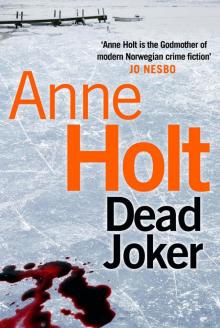 Dead Joker
Dead Joker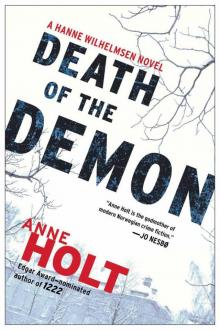 Death of the Demon: A Hanne Wilhelmsen Novel
Death of the Demon: A Hanne Wilhelmsen Novel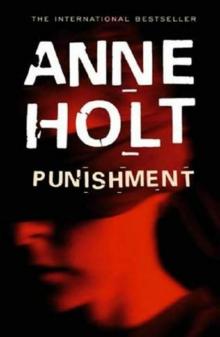 Punishment aka What Is Mine
Punishment aka What Is Mine Beyond the Truth
Beyond the Truth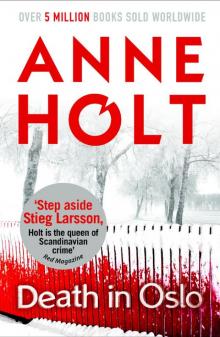 Death in Oslo
Death in Oslo The Blind Goddess
The Blind Goddess What Never Happens
What Never Happens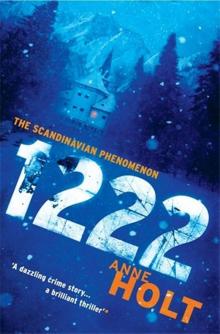 1222
1222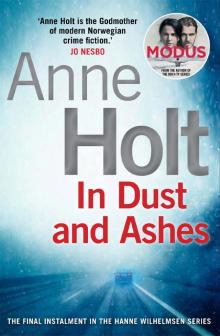 In Dust and Ashes
In Dust and Ashes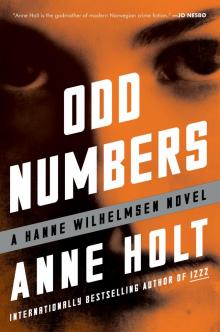 Odd Numbers
Odd Numbers What is Mine
What is Mine What Dark Clouds Hide
What Dark Clouds Hide Blessed Are Those Who Thirst
Blessed Are Those Who Thirst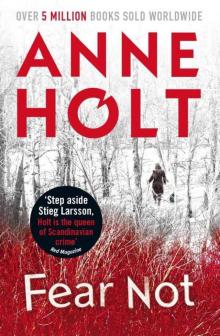 Fear Not
Fear Not No Echo
No Echo Hanne Wilhelmsen - 01 - The Blind Goddess
Hanne Wilhelmsen - 01 - The Blind Goddess